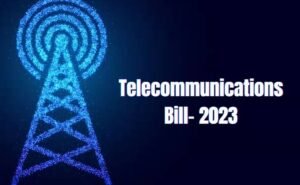The Union IT Minister Ashwini Vaishnav tabled the Telecom Bill, 2023 in Lok Sabha on Monday. The government decided to allocate satellite broadband spectrum, mandate biometric authentication of new telecom users, encryption standards for internet communication, and the power to take over the telecom networks during wartime. Also, the proposed bill replaces three existing laws, focusing on authorization, consumer protection, and so much more. However, concern arises over the attempt to categorise it as a Money Bill.

Key Aspects of Telecom Bill:
Replacing three existing outdated laws– the Indian Telegraph Act, 1885, the Telegraph Wires Act, 1950, and the Indian Wireless Telegraphy Act, 1993.
Priority to authorization from the government like providing telecom services, possessing radio equipment and expansion of telecommunication networks. Along with this, spectrum allocation will be assigned through the auctions and only for specific uses like national security, defence, weather forecasting, disaster management, and much more.

Giving protection to users that include encrypted messages, allowing users to report malware or any specific activity. Also, interception and surveillance of the messages that get monitored to legitimate public safety and security to prevent the offences.
Likewise, the Digital Bharat Nidhi is a fund established by the government to provide telecom services in rural or underserved areas, which is based under the 1885 Act. Also, this allows us to do research and required development. Nevertheless, national security is prioritized to prohibit the use of telecom equipment by an individual or any country for the security of the country.
And, to put more probes into such acts, there are penalties and offences for unauthorized use of telecom networks or data. The individual will face either imprisonment of three years or a fine of Rs 200 crore, or both. If the terms and conditions of the authorization are violated then a civil penalty up to Rs 5 crore will be taken.
Moreover, it gives power and the right way to prescribe standards and assessments of telecom equipment, networks and services. Also, it provides a facility to seek public or private property to establish telecom infrastructure.
Why the bill is being categorise under the Money Bill?

The Telecom Bill 2023 classified as the ‘Money Bill’ has been a controversial aspect of its introduction in the Lok Sabha. The purpose of the bill is to do financing over telecom infrastructure and services to the underserved part of the country. However, the opposition claims that the Digital Bharat Nidhi funding is recognized as the Appropriation of Article 110 (Money Bill) of the constitution.
So, if the Lok Sabha gives the green signal, then the bill will be passed to the Rajya Sabha. And once it’s done, it will give an advantage to the government to modernize the rules and regulations of the telecom sector. However, potential implications like delay in the passing of the bill, political disturbances and public scrutiny will affect the Supreme Court’s decision.
Current Status :
The Bill is under debate on the various provisions of the bill in the Lok Sabha, and the final form is still being negotiated. Besides, if the bill gets passed by the Lok Sabha, then it will be sent forward to the Rajya Sabha, where the discussion will be on the bill being under the category of a Money Bill. Once it will be passed by both houses, it will be sent to the President for approval before becoming law.
Furthermore, the exact timeline and date of the bill’s passage are still uncertain. But it is expected to get the update regarding the bill shortly.












Comments 1